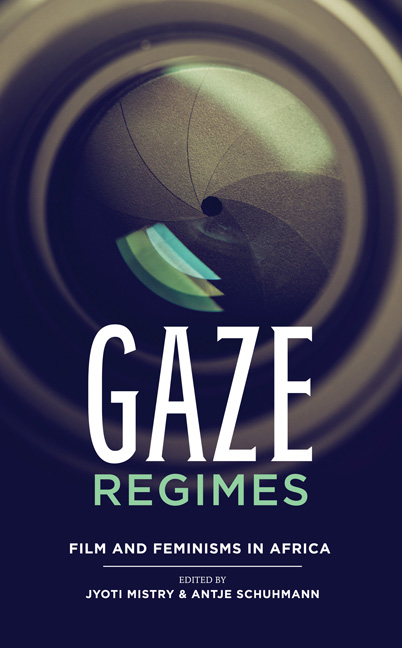Book contents
- Frontmatter
- Contents
- Acknowledgements
- Foreword: Goethe-Institut sub-Saharan Africa
- Introduction: By way of context and content
- 1 African Women in Cinema: An overview
- 2 ‘I am a feminist only in secret’
- 3 Staged Authenticity: Femininity in photography and film
- 4 ‘Power is in your own hands’: Why Jihan El-Tahri does not like movements
- 5 Aftermath – A focus on collective trauma
- 6 Shooting Violence and Trauma: Traversing visual and social topographies in Zanele Muholi's work
- 7 Puk Nini – A Filmic Instruction in Seduction: Exploring class and sexuality in gender relations
- 8 I am Saartjie Baartman
- 9 Filmmaking at the Margins of a Community: On co-producing Elelwani
- 10 On Collective Practice and Collected Reflections
- 11 ‘Cinema of resistance’
- 12 Dark and Personal
- 13 ‘Change? This might mean to shove a few men out’
- 14 Barakat! means Enough!
- 15 ‘Women, use the gaze to change reality’
- 16 Post-colonial Film Collaboration and Festival Politics
- 17 Tsitsi Dangarembga: A manifesto
- Acronyms and Abbreviations
- List of Contributors
- Filmography
- Index
9 - Filmmaking at the Margins of a Community: On co-producing Elelwani
Published online by Cambridge University Press: 20 April 2018
- Frontmatter
- Contents
- Acknowledgements
- Foreword: Goethe-Institut sub-Saharan Africa
- Introduction: By way of context and content
- 1 African Women in Cinema: An overview
- 2 ‘I am a feminist only in secret’
- 3 Staged Authenticity: Femininity in photography and film
- 4 ‘Power is in your own hands’: Why Jihan El-Tahri does not like movements
- 5 Aftermath – A focus on collective trauma
- 6 Shooting Violence and Trauma: Traversing visual and social topographies in Zanele Muholi's work
- 7 Puk Nini – A Filmic Instruction in Seduction: Exploring class and sexuality in gender relations
- 8 I am Saartjie Baartman
- 9 Filmmaking at the Margins of a Community: On co-producing Elelwani
- 10 On Collective Practice and Collected Reflections
- 11 ‘Cinema of resistance’
- 12 Dark and Personal
- 13 ‘Change? This might mean to shove a few men out’
- 14 Barakat! means Enough!
- 15 ‘Women, use the gaze to change reality’
- 16 Post-colonial Film Collaboration and Festival Politics
- 17 Tsitsi Dangarembga: A manifesto
- Acronyms and Abbreviations
- List of Contributors
- Filmography
- Index
Summary
Nestled in the most north-eastern part of South Africa, close to the border of Zimbabwe, lies the rich cultural landscape of the Venda people. It is a community informed by a long tradition of royal lineage and a vibrant history woven with incredible legends of sacred forests and lakes. It is the smallest ethnic group in South Africa and its language, Tshivenda, is spoken almost exclusively by those of the community. Tshivenda has not been widely adopted like isiZulu or isiXhosa in an urban environment. The language is described as melodic and lyrical in its use of innuendo, which draws strongly from the oral histories and customs of the community. It was this location and the language that was the inspiration for director Nshavheni Wa Luruli's film Elelwani (2012), which is based on the first Tshivenda novel (of the same name) by Dr Titus Maumela.
The experiences of being a co-producer on Elelwani gave me immediate access to the community and a privileged perspective of how the community had viewed the novel historically, and how they interacted with the material in a contemporary context through the production process.
It is my intention here to connect aspects of the production process with the narrative content of the film and its interpretation, both from a close textual reading (as is the convention of textual analysis), and with the interpretation of the story and characters as experienced during the production process by the community (particularly by the women) it claimed to be representing. The aim of this approach is to offer some reflection on what the expectations of filmmaking were in a community that is economically impoverished. In this sense, the idea of film is not simply a didactic tool but an instrument (through the production and location filming) to empower people economically in the region. This relationship between filmmaking as an instrument to empower a community so that they might gain economically from the ‘industry’ component of filmmaking is distinct from considering the film (the end product) that serves to empower women through its representation. Finally, I will turn my attention to how content might reflect some of the inherent gender contradictions in this community, bringing to the fore questions of gender empowerment and, perhaps, how it belies expectations when interpreted from a Western-normative paradigm.
- Type
- Chapter
- Information
- Gaze RegimesFilm and feminisms in Africa, pp. 118 - 132Publisher: Wits University PressPrint publication year: 2015



